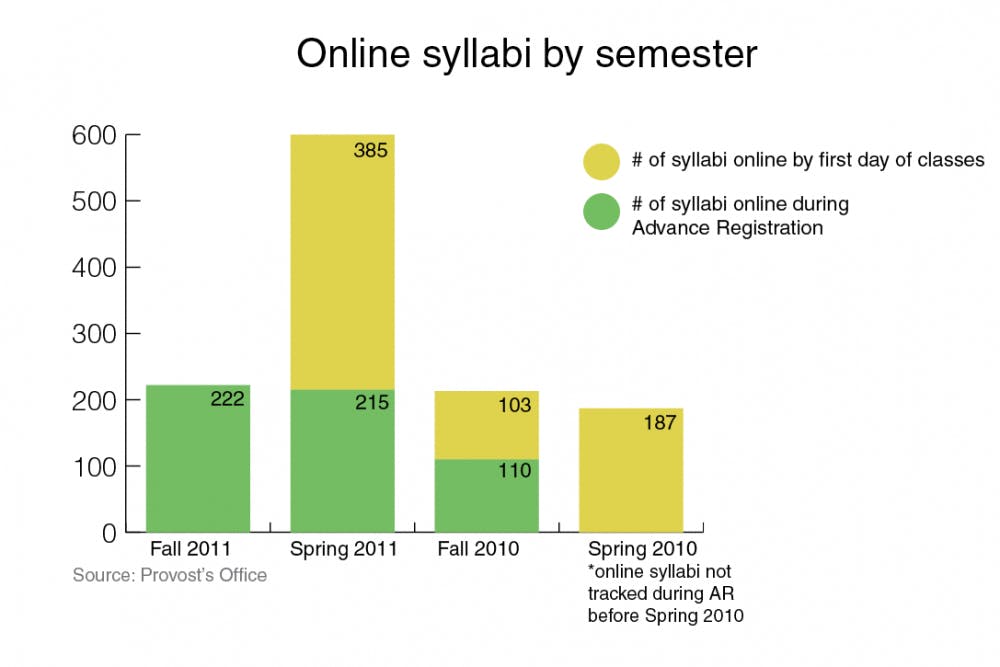
When College freshman Kiara Vaughn was sizing up potential courses on Penn InTouch over the summer, she was frustrated to find one thing missing: copies of syllabi.
While hundreds of professors have begun to upload syllabi online in recent years, hundreds more have yet to make their way onto the internet.
For Penn President Amy Gutmann, finding a solution to fill in that gap isn’t going to come from the University’s administration.
Although Gutmann encourages professors to put their syllabi onto Penn InTouch, she said “it would not be appropriate for me to mandate the practice [University-wide].”
“This is really in the realm of faculty governance and at the school level,” she said. “I think students should participate in expressing their views to faculty, who in turn I hope will continue a strong trend of putting more and more syllabi online.”
Two hundred and twenty two syllabi were available to students on Penn InTouch during advance registration for this semester, according to the Provost’s Office. This marks an increase from 215 online syllabi during spring 2011 advance registration, and 110 online syllabi during the same period in fall 2010.
On the first day of classes last spring, 600 syllabi had been uploaded online, compared to 213 in fall 2010. The current semester’s total was not yet available at the time of publication.
For Vaughn, having access to more online syllabi over the summer “would have made the transition to college courses a lot easier and less stressful,” she said.
“Placing syllabi online is a fundamental thing that the University should absolutely be mandating for everybody,” she added.
However, student and faculty leadership cautioned that a University-wide mandate might not be the most pragmatic way to encourage more professors to upload their syllabi online.
“Fundamentally, mandates don’t work,” said College and Wharton sophomore Abe Sutton, the Undergraduate Assembly’s academic affairs director. “I don’t believe that’s the way to serve our student body.”
Both the UA and the Student Committee on Undergraduate Education have been lobbying for more access to online syllabi for nearly six years. SCUE began the University-wide initiative in 2005 by first encouraging Penn to create a mechanism to upload syllabi.
While both organizations have met frequently with administrators to discuss various ideas over the years, Wharton junior Scott Dzialo, SCUE’s vice chairman, emphasized that any solution must come through a collaborative process between students and professors.
“SCUE believes that every student should have as much information as possible when they make course decisions,” Dzialo said. “Syllabi online is a key step to making registration as transparent as possible.”
Over the past few years, Dzialo said SCUE has sent personalized letters to professors, encouraging them to put their syllabi onto the internet. For a majority of professors, the results have been “very positive,” he added.
However, College of Arts and Sciences Dean Dennis DeTurck said a number of roadblocks to achieving full faculty participation still stand in the way.
For one, he explained, many professors do not know in the spring semester what their syllabus might look like in the fall.
“I’d rather put up nothing than put up something that’s going to be wrong … because it was a rushed decision,” DeTurck said.
For another, he added, the contents of some course syllabi — particularly in the humanities — could be seen as intellectual property.
Professors in areas like English “are organizing their syllabi in highly original ways,” he said. “They might not want their ideas out there online, for everybody to see.”
While DeTurck does not support a College-wide mandate for online syllabi, he emphasized that “there is great value to see in the practice [of putting syllabi online], and I’m not sure that everyone has seen it.”
Georgette Chapman Phillips, vice dean of the Wharton School’s undergraduate division, agreed. Though she too does not believe in a school-wide requirement for online syllabi, she hopes professors will continue to respond to students’ requests.
“Students have a right to know what’s being taught in class,” she said. “That’s the bottom line.”
The Daily Pennsylvanian is an independent, student-run newspaper. Please consider making a donation to support the coverage that shapes the University. Your generosity ensures a future of strong journalism at Penn.
DonatePlease note All comments are eligible for publication in The Daily Pennsylvanian.





